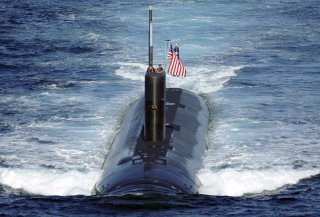Surviving Isolation: A Submariner’s Tips That Could Help in Coronavirus Hell
"We’re about a month into our collective COVID-19 isolation experience, which means we have five months to go. Or at least, that’s what I am used to. A typical submarine deployment lasts six months."
We’re about a month into our collective COVID-19 isolation experience, which means we have five months to go. Or at least, that’s what I am used to. A typical submarine deployment lasts six months. You may question, “We have five months left!?” That must seem daunting, but with most summer festivals and concerts canceled and swirling questions about keeping virtual classrooms into the fall, five months or more of physical distancing and this new normal is a realistic outcome.
The Good News?
You’ve made it through the hardest part. Transitions are difficult. If your life is anything like a deployment, after the first month, the growing pains—confinement, losing track of the days, stale air, and only a few humans to personally interact with—have given way to a routine that works well enough. Personally, I’ve just regathered myself, which has given me time to write this.
What’s Next?
Months two through five end up being pretty stable. Your routine is fairly set. Here are some tips to employ:
- Anything is a pull-up bar. Submarines are hardened for warfare; therefore, many railings, ladders, and fixtures are welded on and sturdy enough for a quick set of pull-ups. Now that your gym access has been disrupted, it’s time to use your environment instead of a traditional gym to work out. Workouts can be one minute, they can be in whatever you are wearing, and you can work out in ten mini sessions a day. For instance, I’ve taken up overhead child pressing, however many household objects are available. I wouldn’t exactly try to hang from your ceiling fans, otherwise, be creative.
- Get comfortable with brown meals. On a submarine, the “fresh” food, eggs, milk, vegetables, etc., are consumed in the first few weeks, never to return. Since we are not submerged, food resupplies are slightly more available; nonetheless, to maximize physical distancing, brown foods offer staying power. Chicken and rice and oatmeal with peanut butter or honey are staples. A corollary to consider is hot sauce as both a condiment and a seasoning. Any meal is palatable with the right hot sauce.
- Get sun and air each day. Submarines are driven by a communications schedule—a cyclic routine to transmit or receive the latest news. We use this precious time at “PD” (Periscope Depth) sometimes twenty to thirty minutes or less, to take a look around (required for our safety) and refresh the air. Applying this to our current environment, set a schedule to spend time by an open window, sit on your front porch or balcony, or maintain safe distancing and go for a short walk.
Light at the End of the Tunnel?
Yearning for freedom is insatiable at the end of a long deployment. While it’s good to be forward-looking, this reduces your patience for your environment and increases tensions with others. The likely scenario is that most cities and states will re-open before Boston or New York can relax. Some people will be desperate to get a jump start on returning to normal, much to the frustration of others still heeding isolation and physical distancing. Leaders will have to strengthen their resolve and messaging to ensure safety as these feelings grow. Citizens that want to maintain safe distances will need to understand that the status quo established during months two through five is gone.
Redeployment?
Once you return home, it’s only a few months until the next deployment. Take the lessons you learned and embrace them. Make them part of who you are and how you operate. That doesn’t mean stay physically distant, but if you’ve taken up new hobbies, keep them. If you took up baking, started weekly virtual dinners with remote family and friends, or sought out new opportunities to volunteer in your local community, then keep them up! There will be a next crisis, possibly another wave of COVID-19. The tools you are developing now will make you more resilient and adaptive to future challenges, so don’t pass up the opportunity for growth.
Join the debate. Be in the know.
“Submarine”-r or sub-“mariner”? You probably didn’t know that this is a debate. “Submarine”-r, although it feels awkward to say, is usually preferred because we are submarine operating professionals. Sub-“mariner” has significant support by those that translate the meaning to a professional mariner that operates underwater, but its detractors think it means an inferior class of sea-going professionals. How did you pronounce the title?
Andrew Lawrence is a class of 2020 MPA candidate at Harvard Kennedy School and serves in the U.S. Navy Submarine Force as a Lieutenant Commander with thirteen years of experience.

